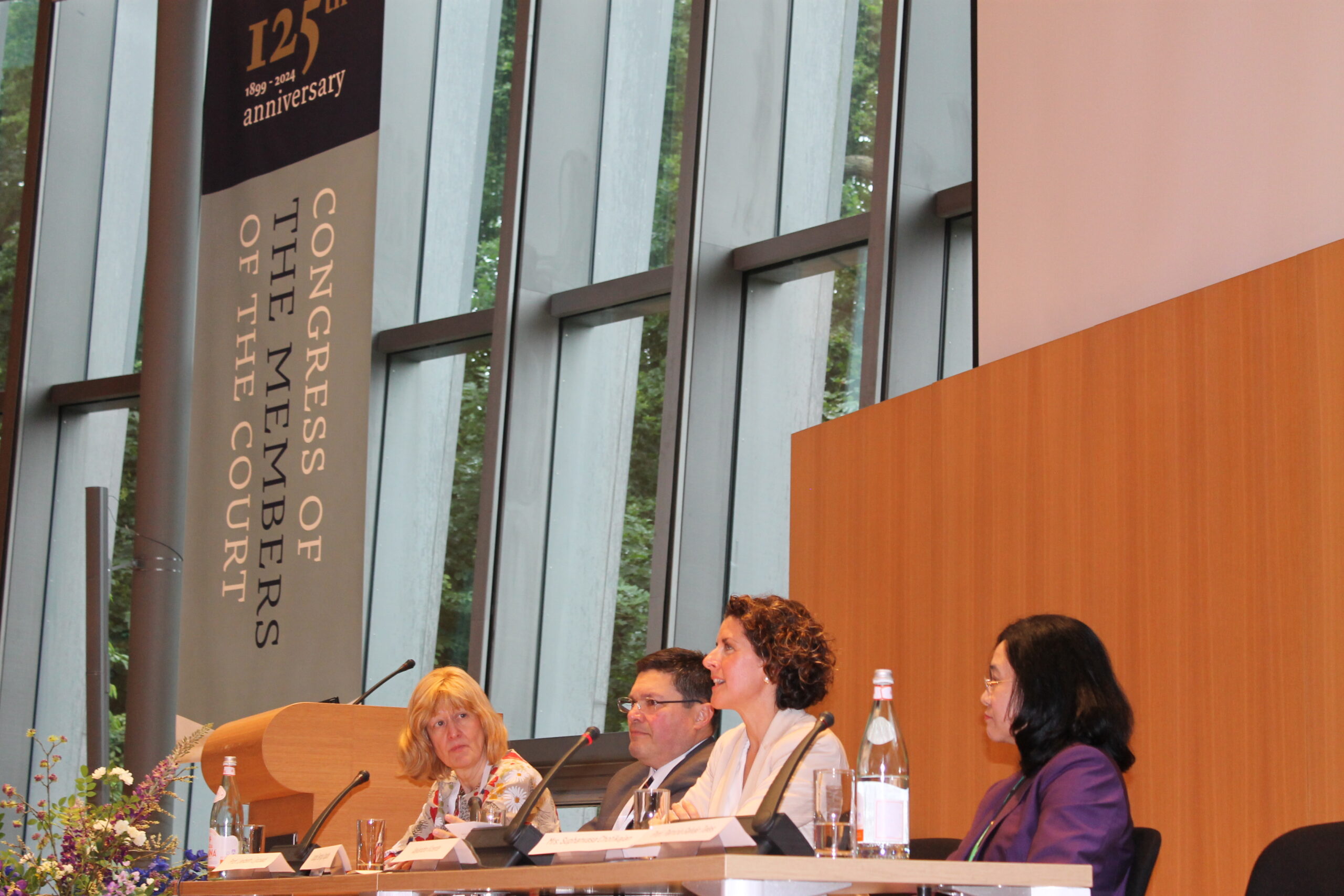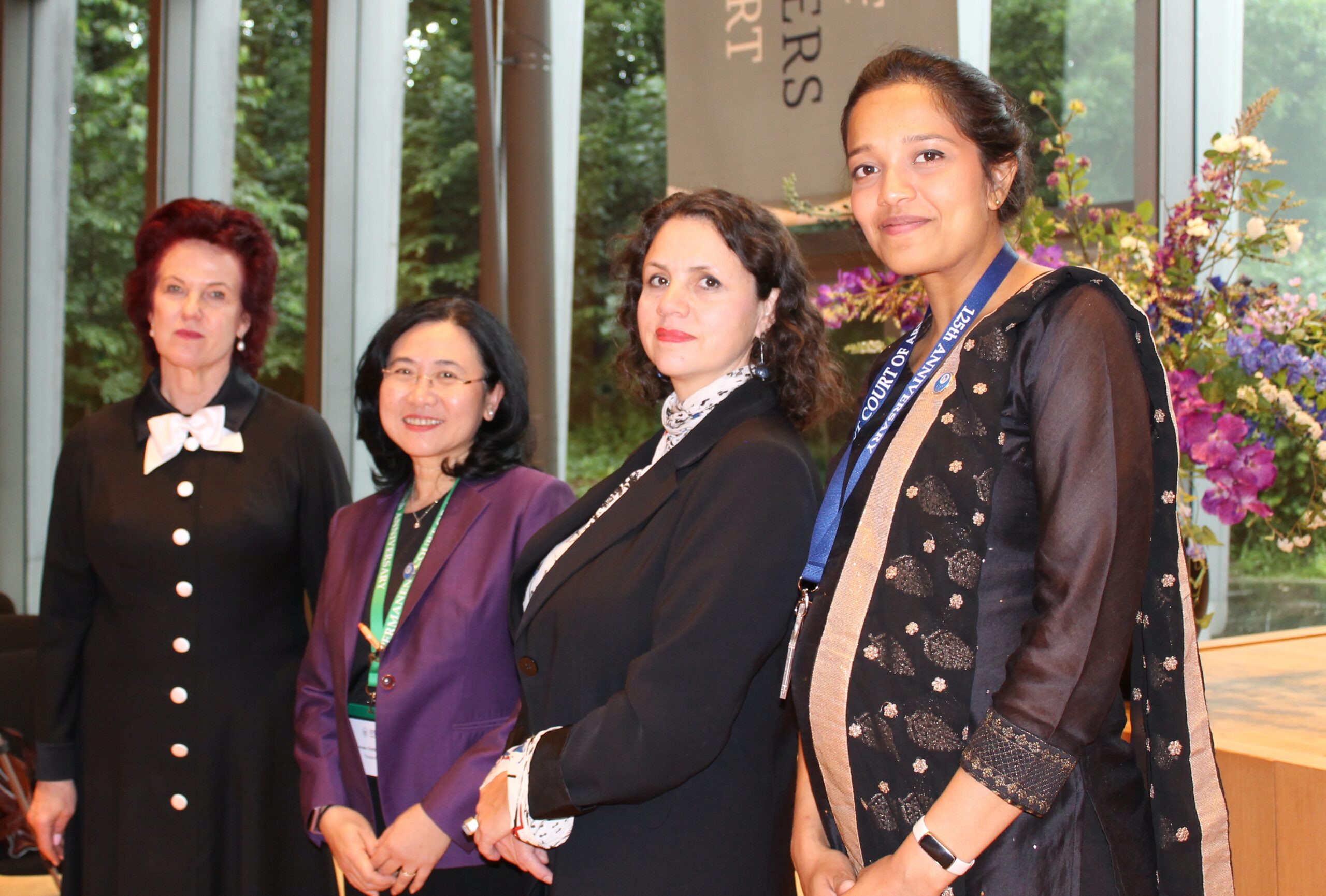Celebrating the 125th Anniversary of the Permanent Court of Arbitration: A Push for Gender Equality and Inclusion
The Permanent Court of Arbitration (PCA) recently hosted its 125th anniversary celebration at the Peace Palace in The Hague. As part of the Third Congress of Members of the Court, the panel “Equal and Inclusive Representation of Women in the Membership of the PCA and the ICJ” provided an opportunity to reflect on the long-standing gender disparities within these institutions. This side event, organized by the GQUAL Campaign and sponsored by the Embassies of Portugal, Latvia, Chile and the Ministry of Foreign Affairs of Thailand, aimed at promoting dialogue among relevant stakeholders, including States and members of the PCA, on the steps necessary to achieve gender parity in the membership of the PCA and the Iinternational Court of Justice (ICJ), ensuring the principles of non-discrimination and gender equality. The discussion, moderated by Alejandra Vicente, allowed the audience to engage directly with the panelists on key issues, including practical strategies to address inclusivity and promote gender parity representation in international law and arbitration.
Opening Remarks: Setting the Tone
Ashwita Ambast, Legal Counsel at the PCA, opened the discussion by tracing the history of gender representation in international arbitration. She raised thought-provoking questions, including: How does underrepresentation affect decision-making? And what steps can we take to increase gender parity? These questions framed the ensuing discussion, highlighting the critical need for gender diversity to enhance the legitimacy and effectiveness of international legal institutions.
The Urgency of Gender Representation
PCA Members Prof. Patricia Galvão Teles, who is also a member of the International Law Commission (ILC), and Prof. Liesbeth Lijnzaad, a Judge at the International Tribunal for the Law of the Sea, emphasized that while regional representation in the PCA, ICJ and ILC has historically been considered, gender parity has been consistently neglected. As practical measures to change this situation, Galvão Teles proposed increasing transparency in candidate nominations, ensuring gender parity in calls for applications, and strengthening merit-based selection processes. Similarly, Lijnzaad emphasized the PCA‘s critical role in advocating for professionals who may not fit the traditional image of an arbitrator (“male, pale, stale”), thereby broadening the pool of potential candidates and addressing historical imbalances.
Liesbeth Lijnzaad also stressed the urgency of having representation in the national groups that select members to the PCA. “The average arbitral tribunal has one woman or less, so we need to change the image of arbitration to make it more attractive to a wider range of people,” she noted. This change, she argued, is essential to making arbitration a more inclusive field.
Highlighting progress and areas for improvement
Judge Sergio Ugalde noted the significant progress made by the International Criminal Court (ICC) in recent years. Judge Ugalde, who is also a PCA Member, noted that the ICC had low female representation for a number of years, but now 11 out of 18 judges are women. This is in part thanks to an election process that includes non-binding quotas requiring States to consider regional and gender diversity, as well as representation from different legal systems. Currently, many important positions within the Court are held by women, including the current President of the Court. This progress demonstrates the impact of deliberate policies to promote gender diversity.
Suphanvasa Chotikajan Tang, Director General of the Department of Treaties and Legal Affairs at the Ministry of Foreign Affairs of Thailand, highlighted the importance of providing young women with opportunities and exposure in international spaces. “Bringing young women into international arenas enhances their competencies and skills,” she said, pointing out that her department is 59 percent female. She emphasized that women’s voices are essential, especially when it comes to violence against women. “Women cannot be considered as a homogeneous category,” she noted, emphasizing that intersectionality is crucial for meaningful gender representation.
Judge Ugalde emphasized the importance of meaningful representation of women at the ICC that goes beyond quotas and statistics. “Promoting meaningful representation of women from around the world, including those from regions with limited educational opportunities, is essential to shaping equitable opportunities in international law-making bodies,” he said. Suphanvasa Chotikajan Tang agreed, stressing that education and practical experience are essential to closing the gender representation gap in international organizations.
Solvita Āboltiņa, Ambassador Extraordinary and Plenipotentiary of the Republic of Latvia to the Kingdom of the Netherlands, shared striking statistics about gender representation in Latvia. “82% of judges and 60% of prosecutors in Latvia are women,” she noted, underscoring the high representation of Latvian women in decision-making positions. This serves as a model for other countries seeking to improve gender equality in their legal systems.
Operational Paragraph 18: A milestone for gender representation
One of the most significant outcomes of the Congress was the adoption of Operational Paragraph 18 of the Resolution of the Congress, which urges Parties and the PCA to promote diversity in international arbitration, “in particular through consolidating gender equality and to promote the presence of women in technical and decision-making position within the institution, further increasing the number of female arbitrators appointed, and raising awareness amongst the Contracting Parties to achieve and increasing participation of women in other instances, such as national groups”.
As such, the PCA’s 125th anniversary celebration was not only a look back at its rich history, but also a call for action to ensure a more inclusive future for the Court. The discussions and resolution adopted during this Congress underscore an ongoing commitment to promoting gender equality and diversity in global justice, setting a clear roadmap to achieve this goal.







